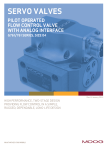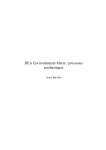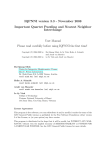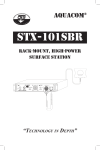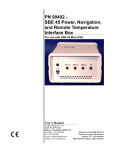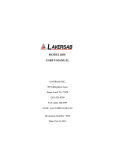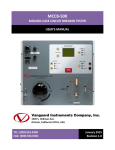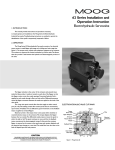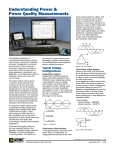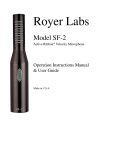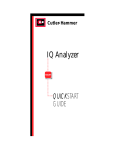Download 72 Series Servo Valves
Transcript
SERVO VALVES PILOT OPERATED FLOW CONTROL VALVE WITH ANALOG INTERFACE 72 SERIES ISO 10372-06-05-0-92 Rev. R, August 2013 HIGH PERFORMANCE, TWO-STAGE DESIGN PROVIDING FLOW CONTROL IN A SIMPLE, DEPENDABLE, LONG-LIFE DESIGN WHAT MOVES YOUR WORLD INTRODUCTION Moog 72 Series Flow Control Servo Valves Whenever the highest levels of motion control performance and design flexibility are required, you’ll find Moog expertise at work. Through collaboration, creativity and world-class technological solutions, we help you overcome your toughest engineering obstacles. Enhance your machine’s performance. And help take your thinking further than you ever thought possible. TABLE OF CONTENTS INTRODUCTION Product Overview 3 Features and Benefits 4 Description of Operation 5 TECHNICAL DATA General, Hydraulic, Static and Dynamic 6 Response Curves 7 Electrical Data 8 Installation Drawings and Null Adjust Instructions 9 Hole Pattern for Mounting Surface 10 BACKGROUND Null Flow Adjustment 11 Flow Calculation and Null Cut Options 12 Related Products 13 Routine Maintenance Guidelines 14 About Moog 15 ORDERING INFORMATION Accessories and Spare Parts 17 Ordering Code 18 This catalog is for users with technical knowledge. To ensure all necessary characteristics for function and safety of the system, the user has to check the suitability of the products described herein. The products described herein are subject to change without notice. In case of doubt, please contact Moog. Moog is a registered trademark of Moog Inc. and its subsidiaries. All trademarks as indicated herein are the property of Moog Inc. and its subsidiaries. For the full disclaimer refer to www.moog.com/literature/disclaimers. For the most current information, visit www.moog.com/industrial or contact your local Moog office. Rev. R, August, 2013 2 INTRODUCTION Moog 72 Series Flow Control Servo Valves PRODUCT OVERVIEW The 72 Series flow control servo valves are throttle valves for 3 and preferably 4-way applications. They are a high performance, 2-stage design that covers the range of rated flows from 95 to 225 l/min (25 to 60 gpm) at 35 bar (500 psi) valve pressure drop per spool land. The output stage is a closed center, four-way sliding spool. The pilot stage is a symmetrical double-nozzle and flapper, driven by a double air gap, dry torque motor. Mechanical feedback of spool position is provided by a cantilever spring. The valve design is simple and rugged for dependable, long life operation. These valves are suitable for electrohydraulic position, speed, pressure or force control systems with high dynamic response requirements. The 72 Series is ideally suited for applications in the 95 to 225 l/min (25 to 60 gpm) when superior dynamics are a must. Intrinsically safe valve versions are available for use in applications with potentially hazardous environments. Specific models are certified to FM, ATEX, CSA, TIIS and IECEx standards. Valve design 2-stage, with spool and bushing and dry torque motor Mounting surface ISO 10372-06-05-0-92 Rated flow at µpN 35 bar/spool land 95 l/min 150 l/min 225 l/min (500 psi/spool land) (25 gpm) (40 gpm) (60 gpm) Maximum operating pressure to ports P, T, A, B, X 210 bar (3,000 psi) Pilot Design Nozzle Flapper Step response time for 0 to 100% stroke 11 ms 18 ms 33 ms TIIS Intrinsically safe valve versions are available for use in potentially hazardous environments. Specific models are certified to FM, ATEX, CSA TIIS and IECEx standards. Contact Moog for details. Rev. R, August, 2013 3 INTRODUCTION Moog 72 Series Flow Control Servo Valves FEATURES AND BENEFITS The 72 Series is part of Moog’s family of Mechanical Feedback Servo Valves. This is proven technology that performs reliably in machines where high performance, stability and accuracy are required. Moog’s Mechanical Feedback Valves are designed to provide high reliability and long service life. Features Benefits 2-stage design Enables high machine performance, faster cycle times and greater accuracy - all resulting in higher productivity 100% factory tested to ensure critical specification performance Ensures smooth and easy startup, reduces downtime and insures long life in critical industrial applications Dual Coil torque motor Redundancy for high reliability Dual Precision Nozzles in Torque Motor Precision flow control and predictability Dry torque motor design Eliminates potential contamination issues in the air gaps of the torque motor that could cause machine downtime Hardened 440C Bushing and Spool Provides for long life, wear resistance when used in the harsh environments; provides for low sliding friction during use Emergency failsafe positioning Most valves are set up to return to a failsafe position when the command signal is interrupted or eliminated Field replaceable pilot stage filter Enables preventive maintenance in the field, saving precious machine downtime and service costs External null bias adjustment Enables technicians to manually adjust the null bias of the valve to adapt to the conditions of the machine (see section on null flow adjustment – Page 12). This feature provides a simple adjustment to machine performance without the need to adjust a controller. Rev. R, August, 2013 4 INTRODUCTION Moog 72 Series Flow Control Servo Valves DESCRIPTION OF OPERATION The 72 Series Flow Control Servo Valve consists of a polarized electrical torque motor and two stages of hydraulic power amplification. The motor armature extends into the air gaps of the magnetic flux circuit and is supported in this position by a flexure tube. The flexure tube acts as a seal between the electromagnetic and hydraulic sections of the valve. The 2 motor coils surround the armature, one on each side of the flexure tube. The second stage is a conventional four-way spool design in which output flow from the valve, at a fixed valve pressure drop, is proportional to spool displacement from the null position. A cantilevered feedback spring is fixed to the flapper and engages a slot at the center of the spool. Displacement of the spool defects the feedback sprint which creates a force on the armature/flapper assembly. Input signals induce a magnetic charge in the armature and cause a deflection of the armature and flapper. This assembly pivots about the flexure tube and increases the size of one nozzle orifice and decreases the size of the other. The flapper of the first stage hydraulic amplifier is rigidly attached to the midpoint of the armature. The flapper extends through the flexure tube and passes between 2 nozzles, creating two variable orifices between the nozzle tips and the flapper. The pressure controlled by the flapper and nozzle variable orifice is fed to the end areas of the second stage spool. The differential pressure created by this action causes spool motion. The resulting spool displacement induces a linear force in the feedback wire which opposes the original input signal torque. Spool movement continues until the feedback wire force equals the input signal force. Electro-hydraulic Servo Valve Cut-away Coil Upper Polepiece Armature Connector Magnet (not shown) Flexure Tube Lower Polepiece Feedback Wire Flapper Nozzles Spool Bushing Inlet Orifice P Rev. R, August, 2013 B T A 5 TECHNICAL DATA Moog 72 Series Flow Control Servo Valves 72 SERIES SERVO VALVES General Technical Data Valve design 2-stage, with spool and bushing and dry torque motor Pilot stage Nozzle Flapper Standard Dynamics Mounting pattern ISO 10372-06-05-0-92 Installation position Any orientation, fixed or movable Weight 3.52 kg (7.75 lb) Storage temperature range -40 to +60 °C (-40 to +140 °F) Ambient temperature range -40 to +135 °C (-40 to +275 °F) Vibration resistance 30 g, 3 axis, 10 Hz to 2 kHz Shock resistance 30 g, 3 axis Seal material Fluorocarbon (FKM) 85 SHORE Others upon request Hydraulic Data Maximum operating pressure to ports P, T, A, B 210 bar (3,000 psi) - - - 350 bar (4,500 psi) special Rated flow at pN 35 bar/spool land (500 psi/spool land) 95 l/min (25 gpm) 150 l/min (40 gpm) 225 l/min (60 gpm) Null adjust authority Greater than 10% of rated flow Hydraulic fluid Hydraulic oil per DIN 51524 parts 1 to 3 and ISO 11158. Other fluids on request. Temperature range -40 to +60 °C (-40 to +140 °F) Recommended viscosity range 10 to 85 mm2/s (cSt) Maximum permissible viscosity range 5 to 1,250 mm2/s (cSt) Recommended filter rating For functional safety ß10 75 (10 µm absolute) For longer lifeß5 75 (5 µm absolute) Static and Dynamic Data (at 3,000 psi) Rated flow tolerance ± 10% Step response time for 0 to 100% stroke 95 l/min (20 gpm) = 11ms 150 l/min (40 gpm) = 18 ms 225 l/min (60 gpm) = 33 ms Threshold <1.5% Hysteresis <4.0% Null shift for ∆T = 38 °C (100 °F) <2.0% Rev. R, August, 2013 6 TECHNICAL DATA Moog 72 Series Flow Control Servo Valves +2 80 2 60 0 -2 1 -4 2 -6 100 -8 -10 40 20 60 40 3 0 10 30 20 96 l/min (25 gpm) Plot 1 @ 210 bar (3,000 psi) Plot 2 @ 70 bar (1,000 psi) 40 Time (ms) 100 7 80 1 2 60 10 15 20 20 30 50 100 200 Frequency (Hz) 96 l/min (25 gpm) Plot 1 & 3 = ±40% rated signal (solid) Plot 2 & 4 = ±100% rated signal (dash) Amplitude Ratio (Decibels) Stroke (% of Rated Signal) 80 4 +2 0 -2 1 -4 2 -6 100 -8 -10 40 80 4 60 3 40 20 20 10 30 20 100 80 7 1 60 2 10 15 20 50 100 200 Frequency (Hz) +2 0 -2 1 -4 2 100 -6 80 -8 4 -10 40 30 154 l/min (40 gpm) Plot 1 & 3 = ±40% rated signal (solid) Plot 2 & 4 = ±100% rated signal (dash) Amplitude Ratio (Decibels) Stroke (% of Rated Signal) 154 l/min (40 gpm) Plot 1 @ 210 bar (3,000 psi) Plot 2 @ 70 bar (1,000 psi) 40 Time (ms) 60 3 40 20 20 0 10 20 231 l/min (60 gpm) Plot 1 @ 210 bar (3,000 psi) Plot 2 @ 70 bar (1,000 psi) Rev. R, August, 2013 30 40 Time (ms) 7 10 15 20 30 50 Phase Lag (Degrees) 0 Phase Lag (Degrees) 1 Phase Lag (Degrees) 100 Amplitude Ratio (Decibels) Stroke (% of Rated Signal) 72 SERIES SERVO VALVES 100 200 Frequency (Hz) 231 l/min (60 gpm) Plot 1 & 3 = ±40% rated signal (solid) Plot 2 & 4 = ±100% rated signal (dash) 7 TECHNICAL DATA Moog 72 Series Flow Control Servo Valves ELECTRICAL DATA Rated current and coil resistance A variety of coils are available for 72 Series Servo Valves, which offer a wide choice of rated c urrents. Coil impedance Inductance is determined under pressurized operating conditions and is greatly influenced by back electromagnetic forces of the torque motor. These effects vary with most operating conditions, and vary greatly with signal frequencies above 100Hz. The apparent coil inductance values given are determined at 50 Hz. The resistance and inductance of standard coils are given below. The 2 coils in each Servo Valve are wound with equal turns giving a normal production tolerance on coil resistance of ±10 %. Copper magnet wire is used, so the coil resistance will vary significantly with temperature. The effects of coil resistance changes can be essentially eliminated through use of a current feedback servoamplifier having high output impedance. Ordering code Recommended rated current [mA] Command signal Coil resistance Power consumption [W] [Ohms/coil at 25°C (77°F)] Single coil Series coils Parallel coils Single coil Series coils Parallel coils 4 ±8 ±4 ±8 1,000 0.064 0.032 0.032 H ±15 ±7.5 ±15 206 0.045 0.023 0.023 L ±40 ±20 ±40 80 0.128 0.064 0.064 Ordering code Coil Inductance [H] Measured at 50 Hz Single coil Series coils Parallel coils 4 3.2 9.7 2.6 H 0.72 2.2 0.59 L 0.22 0.66 0.18 Coil connections A 4-pin electrical connector that mates with an MS3106F14S-2S is standard. All 4 torque motor leads are available at the connector so external connections can be made for series, parallel, or differential operation. 72 Series Servo Valves can be supplied on special order with other connectors or pigtails. Configuration for valve opening P Single A T Series BC D A (+), B (-) or C (+), D (-) Rev. R, August, 2013 B, A A Parallel BC D A (+), D (-), B and C connected A BC D A and C (+), B and D (-) 8 TECHNICAL DATA Moog 72 Series Flow Control Servo Valves INSTALLATION DRAWINGS AND NULL ADJUST INSTRUCTIONS 93.7 (3.69) 73.02 (2.875) 4 36.50 (1.437) 46.86 (1.845) 1 42.88 (1.688) Typical Wiring Schematic 102 (4.02) 85.72 (3.375) A B C 128 (5.04) D 3 50 (1.97) PIN D PIN A 6 PIN B PIN C 70 (2.75) 131 (5.17) 57 (2.24) 7 5 70 (2.75) 98.8 (3.89) 35 (1.38) 2 1 2 3 4 5 6 7 118 (4.65) 83 (3.27) Ø 6.35 (.250) 7.11 (.280) 170 (6.70) Typical wiring schematic Location pin (refer to section Hole Pattern for position) Filter 4X Ø 10.31 mm (0.406 in) thru Mechanical Null Adjust screw (requires 3/8” wrench and 3/32” hex key) Optional Magnetic Null Adjust Connector mates with MS3106-14S-2S Fluid: Industrial hydraulic fluid per DIN 51524 parts 1 to 3 and ISO 11158, maintained to ISO 4406 Code 17/14/11 recommended. Viscosity 10 to 85 mm2/s (cSt) at 38 °C (60 to 300 SUS at 100 °F). Operating Temperature Range: Fluid: -40 to +60 °C (-40 to +140 °F) Ambient: -40 to +135 °C (-40 to +275 °F). Valve Phasing: Flow out port B results when: Series coils: B & C connected, A+, DParallel coils: A & C connected, B & D connected, A and C+, B and DSingle coils: A+/B- or C+/D-. Null Adjust: Flow out port B results with the clockwise rotation of the null adjust screw. Rev. R, August, 2013 Surface: Surface to which valve is mounted requires flatness of 0.05 mm (0.002 in) over 100 mm (3.94 in) and an average finish Ra better the 0.8 µm (0.000032 in) Ports: 14.23 mm (0.562 in) Ø counter-bored 17.65 mm (0.695 in) inside Ø by 22.23 mm (0.875 in) outside Ø Recommended Seals: 90 durometer that is compatible with the hydraulic fluid. P, T, A, and B: Size SAE AS568-019 20.35 mm (0.801 in) inside diameter by 1.78 mm (0.070 in) cross section o-ring X: Size SAE AS568-012 9.25 mm (0.364 in) inside diameter by 1.78 mm (0.070 in) cross section o-ring 9 TECHNICAL DATA Moog 72 Series Flow Control Servo Valves 72 SERIES HOLE PATTERN FOR MOUNTING SURFACE X X P F1 Y F2 G A B F3 F4 T Y Designation A B T X Y G F1 F2 F3 F4 mm 17.48 in 0.688 17.48 0.688 17.48 0.688 17.48 0.688 6.35 0.250 3.18 0.125 7.92 0.312 M10 3/8-16 M10 3/8-16 M10 3/8-16 M10 3/8-16 Position X mm 36.53 in 1.438 11.13 0.438 61.93 2.438 36.53 1.438 55.58 2.188 49.99 1.968 11.13 0.438 0 0 73.03 2.875 73.03 2.875 0 0 Position Y mm 17.48 in 0.688 42.88 1.688 42.88 1.688 68.28 2.688 4.78 0.188 81.79 3.220 28.83 0.938 0 0 0 0 85.73 3.375 85.73 3.375 Size Ø P Notes 1. Surface: ISO 10372-06-05-0-92 Surface to which the valve is mounted requires flatness of 0.05 mm (0.002 in) over 100 mm (3.94 in) and an average finish Ra better than 0.8 µm (0.000032 in). 2. Ports: For maximum flow the ports P, T, A, and B must be designed with diameters of 18 mm (0.688 in). 14.23 mm (0.562 in) Ø counter-bored 17.65 mm (0.695 in) inside Ø by 22.23 mm (0.875 in) outside Ø Rev. R, August, 2013 3. Recommended Seals: 90 durometer that is compatible with the hydraulic fluid. P, T, A, and B: Size SAE AS568-019 20.35 mm (0.801 in) inside diameter by 1.78 mm (0.070 in) cross section o-ring X: Size SAE AS568-012 9.25 mm (0.364 in) inside diameter by 1.78 mm (0.070 in) cross section o-ring 10 BACKGROUND Moog 72 Series Flow Control Servo Valves NULL FLOW ADJUSTMENT It is often desirable to adjust the null flow of a servo valve independently of other system parameters. We provide two means to accomplish this; using a mechanical adjustment on the side of the valve body or an (optional) magnetic adjustment on the top of the torque motor cover. Valves with mechanical null adjustment allow for at least ±10% adjustment of null flow. The mechanical null adjustment is an eccentric bushing retainer pin, located above the tank port designation on the valve body, which if rotated provides control of the bushing location. Mechanical feedback elements position the spool relative to the valve body for a given input signal. Therefore, a movement of the bushing relative to the body changes the null flow. Mechanical Adjustment Procedure With zero current (electrical connector disconnected). Using a 3/8 inch offset wrench, loosen the self-locking fitting until the null adjustor pin can be rotated. (This should usually be less than 1/2 turn). DO NOT remove the self-locking fitting. Insert a 3/32 inch Allen wrench in the null adjustor pin. Use the 3/32 Allen wrench to rotate the mechanical adjustor pin to obtain the desired null flow. Re-torque the self-locking fitting to 57 in lbs. Magnetic Adjustment Procedure With zero current (electrical connector disconnected). Using a blade screwdriver or coin, rotate the magnetic adjustor on top of the motor cap clockwise. If the flow is to the B-port and acceptable, the adjustor should not be rotated more than ±50 degrees. If the flow is to the B-port and unacceptable, rotate the adjustor 180 degrees from the zero null bias which will result in null flow to the A-port with a clockwise rotation. Again, no more than ±50 degrees. The magnetic null adjustment allows at least ±10% adjustment to the null flow. The magnetic null adjustor is located on top of the motor cap which if rotated magnetically biases the first state torque motor. X PORT CONFIGURATION The X Port is provided to allow an external pilot supply to be connected. This feature is usually configured at the factory. However, it can be configured in the field with special instructions and considerations. The external pilot configuration provides for a higher pressure to enable a faster pilot response. Each valve model is developed with a predetermined pilot configuration. If you choose to modify that configuration in the field we offer the following: with two opposing flat blade screwdrivers, than to continue pulling on the screw. Be careful not to damage the o-ring groove. 1. Remove the set screw from the “X” port on the base of the valve using a 1/8’’ Allen wrench. 7. Re-install the filter and filter housing in the cavity. 2. Thread a #2-56 screw into the o-ring plug that is now visible and remove it from the “X” port. 3. Remove the four (4) socket head cap screws and lockwashers that retain the cover plate for the field replaceable filter, using a 3/16’’ Allen wrench. 4. Use one of the screws to pull the filter and filter housing out of the filter cavity of the body. The filter housing has two (2) o-rings on its O.D. The housing will come part way out, then stop after the second o-ring passes the internal relief in the body. At this time it may be easier to remove the visible o-ring and carefully pry the housing and filter out Rev. R, August, 2013 5. A bore will be visible inside the body cavity where the o-ring plug must be inserted. 6. Retain the o-ring plug with the set screw. 8. Re-install the filter cover, retaining screws and lockwashers. Torque the screws to 80-90 in-lbs. Note: If at any time you are uncertain about how to affect the reconfiguration please return it the factory and we will be happy to do it for you. Internal External Pressure Port X Port 11 BACKGROUND Moog 72 Series Flow Control Servo Valves FLOW CALCULATION Q = QN Q QN ∆p ∆p ∆p ∆ pN Flow Diagram Q [l/min (gpm)] The actual flow is dependent upon the electrical command signal and valve pressure drop. The flow for a given valve pressure drop can be approximated using the square root function for sharp edge orifices. 380 (100) 0) 5 (6 22 • • • 0) 0 (4 15 actual flow rated flow actual pressure drop per spool land rated pressure drop per spool land 95 ) (25 38 (10) 1 70 (1,000) 7 (100) 700 (10,000) ∆p [bar (psi)] SPOOL NULL CUT OPTIONS I Input Current Default, without request for optional cuts Rev. R, August, 2013 Q Closed Center Spool Valves Control Flow Q Open Center Spool Valves Control Flow Control Flow Standard Axis Cut I Underlap Zone Input Current Normally used in hydraulic motor applications Q I Overlap Zone Input Current Normally used in failsafe applications 12 BACKGROUND Moog 72 Series Flow Control Servo Valves RELATED PRODUCTS Din Rail Modules - Analog Control Cards Moog’s DIN rail mounted module analog control cards are ideal for use in enclosures where space is limited. Modules include servoamplifers, transducer conditioning electronics, command and auxiliary function modules, valve drive amplifiers, and power supplies. All of these modules are CE marked and require a 24V DC supply. The modules mount to standard 35mm DIN rail mount for easy installation and removal. Din Rail Module PortableValve Testers - Evaluates Valves in the Field Valve testers are a cost effective method for evaluating valves in the field. They provide a quick and easy means of differentiating between hydraulic and electronic problems. There are five models to choose from, each with different levels of capability and flexibility to meet your specific requirements. All valve testers have a compact, easily portable design. Valve Tester Mounting Manifolds - Easier Installation and Maintenance Various mounting manifolds are available for standard industrial valves, including base and adapter types for mounting and flushing requirements. Other hardware such as bolts and connectors are also available. Mounting Manifolds The specific accessories you may need for a particular model are listed in the relevant product catalogs and can be ordered through your local office. Filtration - Oil Filtration Requirements for Industrial Servo Systems The most effective way to reduce life cycle costs of an oil hydraulic system, regardless of the types of valve used, is through close attention to contamination control. For industrial servo systems the ideal system filter arrangement is summarized as follows: • Use a 10 micron (Beta 10 >= 75) high pressure filter without by-pass just before the valve or critical parts of the valve (e.g. pilot) • Use a 3 micron (Beta 3 >= 75) low pressure filter in the return or bypass line. • Use a filter in the tank breather that is at least the same filtration level as the finest filter in the system. This recommendation is based on the fact that most servo and proportional valves can accept the odd particle up to 25 microns so the pressure filter will protect the valve from catastrophic failure. The real work is done by the low pressure filter reducing the small particle contamination which is the prime contributor to component wear and silting. Rev. R, August, 2013 Hydraulic Filters Assuming that the filters are properly dimensioned and care is taken during initial installation and maintenance, the aim should be to limit oil contamination to 16/13 (under the old ISO 4406) or 19/16/13 (under the new ISO 4406). For long life, the maximum levels per the old and new ISO are 15/12 and 18/15/12, respectively. It is important to note that these are maximum contamination levels and with proper care and regular filter change, significantly lower levels can and should be achieved. Attention must also be paid to a number of other factors that contribute to oil condition problems such as elevated temperatures, high tank humidity, “dirty” new oil, etc. 13 BACKGROUND Moog 72 Series Flow Control Servo Valves ROUTINE MAINTENANCE GUIDELINES Every six months or 4,000 operating hours, check for proper operation of the control valve assembly by performing the preventative maintenance steps outlined below. These checks do not require removal of the valve from the process line. If a problem is suspected, repair the valve assembly prior to returning the unit to service. • Replace the hydraulic filter element • Stroke the valve and check for smooth, full-stroke operation; unsteady motion could indicate a servo valve, actuator or process valve problem STORAGE CONDITIONS We recommend the following ambient conditions for storage: • Dust-free, moderately ventilated • As vibration-free and shock-free as possible Shock resistance (as per EN 60068-2-27): 50 g, 6 directions, half-sine 3 ms Vibration resistance (as per EN 60068-2-6): 30 g, 3 axes, frequency 10 to 2,000 Hz GENERAL INFORMATION Temperature Effects when Storing Valves The following effects may occur when storing valves for a long time: • Sealing materials become brittle, possibly resulting in leaks • Hydraulic fluid becomes gummy, possibly resulting in friction Recommended: +15 to +25 °C (+59 to +77 °F Permissible: -40 to +80 °C (-40 to +176 °F Temperature fluctuations >10 °C (50 °F) must be avoided. Distance to shielded radiators: > 1 m (3 ft) No direct exposure to sunlight • Electrolytic capacitors of the valve electronics may fatigue, possibly resulting in adverse effects on the valve electronics No sources of light with a high UV content Storage Time Relative air humidity: < 65 %, non condensing The storage time starts at stock receipt and ends at mounting of the valve. Preservatives UV rays generate ozone, which damage sealing materials. AFTER STORAGE If conservation is carried out, use only conservatives which are compatible with the sealing materials and do not affect the valve, spare parts and accessories. We recommend to check the original packaging, valve, spare parts and accessories for possible damage or alterations due to storage, that is, before use. BEFORE STORAGE Damaged or not functional valves, spare parts and accessories must not be started up. Note: If the valves are exposed to aggressive environmental influences during storage, vacuum packaging may be necessary. We recommend the following preparatory measures for storage: Mount the shipping plate on the valve. This is the only way of adequately protecting the valves against the ingress of dirt and moisture and protecting the seals against the effects of ozone and UV. Put the valve, spare parts and accessories into the original packaging. Package each valve separately. Enclose anti-tarnish paper or package the valve, spare parts and accessories with corrosion inhibiting film. (Only for storage time > 1 year.) Sealing materials with the following characteristics must not be used: • Contamination • Cracking • Hardening/softening • Stickiness • Discoloration Storage Time > 5 Years We recommend that the valve be checked by us or one of our authorized service centers after a storage time of more than 5 years. Multipacks of single valves in their individual packages are allowed. Storage Time > 10 Years Seal the original packaging properly. This is the only way of adequately protecting the valves, spare parts and accessories against damage. After a storage time of more than 10 years the valves have to be checked by us or one of our authorized service centers. Rev. R, August, 2013 14 BACKGROUND Moog 72 Series Flow Control Servo Valves ABOUT MOOG Moog Inc. is a worldwide designer, manufacturer and integrator of precision control components and systems. Moog’s Industrial Group designs and manufactures high performance motion control solutions combining electric, hydraulic, and hybrid technologies with expert consultative support in a range of applications including energy production and generation machinery, industrial production machinery and simulation and test equipment. We help performance-driven companies design and develop their next-generation machines. Moog maintains facilities in 26 countries around the globe. This vast scope ensures that our engineers remain close to the needs of machine builders and provide flexible design solutions and technical expertise tailored to our customers’ toughest challenges. Moog experts work in close collaboration with machine builders and application engineers to design motion control systems for greater productivity, higher reliability, superior connectivity, less costly maintenance and more effective operations. Our regional presence, industry knowledge and design flexibility ensures Moog motion control solutions are tailored to their environment— from meeting operating regulations and performance standards, to taking machine performance to a higher level. Servo Valves Active Cartridge Valves Products At the heart of every Moog solution is an array of products engineered for precision, high performance and reliability. For more than six decades, Moog products have been specified for critical machine applications. Some are developed specifically for unique operating environments. Others are standard equipment on machines across many industries. All are continuously improved to take advantage of the latest technology breakthroughs and advancements. Radial Piston Pumps Moog products include: • Servo Valves and Proportional Valves • Servo Motors and Servo Drives • Servo Controllers and Software • Radial Piston Pumps • Actuators • Integrated Hydraulic Manifold Systems and Cartridge Valves • Slip Rings • Motion Bases Rev. R, August, 2013 Servo Drives 15 BACKGROUND Moog 72 Series Flow Control Servo Valves ABOUT MOOG Hydraulic solutions Since Bill Moog invented the first commercially viable servo valve in 1951, Moog has set the standard for world-class hydraulic technology. Today, Moog products are used in a variety of applications providing high power, enhanced productivity and ever better performance for some of the world’s most demanding applications. Electric solutions Clean operation, low noise generation, less maintenance and reduced power consumption make Moog electric solutions ideal for applications worldwide. Moog is the ideal partner for applications where transitioning technologies requires special expertise. Flight Simulation Hybrid solutions By incorporating the advantages of existing hydraulic and electric technologies - including modular flexibility, increased efficiency and cleanliness into innovative hybrid solutions, Moog offers new performance potential in specialized applications. Formula One Simulation Table Moog Global Support Moog Global Support is our promise to offer world-class Repair and Maintenance Services delivered expertly by our trained technicians. With the reliability only available from a leading manufacturer with facilities around the world, Moog offers you service and expertise you can count on to keep your equipment operating as it should. This promise offers many benefits to our customers including: • Flexible programs, tailored to your needs such as upgrades, preventative maintenance and annual/multiyear contracts • On-site services bring the expertise to you, providing quicker commissioning, set-up and diagnostics • Access to reliable services that are guaranteed to offer consistent quality anywhere in the world For more information on Moog Global Support visit www.moog.com/industrial/service. • Reduce your downtime by keeping critical machines running in peak performance • Protect your investment by ensuring reliability, versatility and long-life of products • Better plan your maintenance activities and make systematic upgrades • Leverage our flexible programs to meet the unique service requirements of your facility Look to Moog for global support including: • Repair services using OEM parts are performed by trained technicians to the latest specifications • Stock management of spare parts and products to prevent unplanned downtime Rev. R, August, 2013 16 ORDERING INFORMATION Moog 72 Series Flow Control Servo Valves ACCESSORIES AND SPARE PARTS Series Dependent Accessories and Spare Parts Accessories 72 Series Part designation Attachment screws Metric Attachment screws Inch Mating connector Mounting manifold Flushing plate AMO manifold CRV manifold Safety manifold Description 4 required M10x50 long ISO 4762-10.9 tightening Torque 36 Nm 3/8 - 16 UNC by 2.0 long tightening torque 318 lbf-in Part number B64929-009B050 4 pin electrical connector Base mounting manifold, four port Manifold employed in place of valve when initially cleaning hydraulic fluids Adjustable metering orifice manifold used to bleed fluid between A and B ports for better pressure control Cross port relief manifold used to limit pressure levels in ports A and B Sandwich manifold used to lock, extend and retract cylinder upon loss of electrical signal or hydraulic pressure -49054F014S002S (MS3106F14S-2S) -22236AM003 G4321AM001 A96920AM015 C66391-332B -65711AM004-XXXX B64467AM Spare Parts 72 Series Part designation Base O-ring for P, T, A and B ports Description Material Part number 4 required for P, T, A, and B ports 20.4 mm Fluorocarbon FKM 85 shore -42082-040 (0.801 in) inside diameter x 1.8 mm (0.070 in) cross section. Equivalent MIL-R-83248 size -019 X port O-ring Replaceable filter, Pilot stage tube 1 required for the X port 9.25 (0.364 in) x -42082-013 1.8 mm (0.070 in) cross section. Equivalent MIL-R-83248 size -012 44 µm nominal -23020 Replaceable filter Field replaceable 20 µm nominal Filter replacement kit Contains the following: Fluorocarbon FKM 85 shore B52555RK099K001 2 pieces O-ring 26.7 mm (1.051 in) inside diameter x 1.8 mm (0.070 in) cross section 1 piece O-ring 9.2 mm (0.364 in) inside diameter x 1.8 mm (0.070 in) cross section 2 pieces O-ring 4 mm (0.161 in) inside diameter x 1.8 mm (0.070 in) cross section 2 pieces O-ring 3.3 mm (0.130 in) inside diameter x 1.8 mm (0.070 in) cross section 1 piece filter tube 44 µm 1 piece Field replaceable filter 20 µm 1 piece motor cap gasket -22050 Documents (not included in scope of delivery) Part designation Description Catalog 72 series general information Remark Part number Note: Visit CDL 6266 www.moog.com/industrial/literature to download document Service manual 72 standard series Note: Visit CDS 6211 www.moog.com/industrial/literature to download document Service manual 72 intrinsically safe (K) series Note: Visit CDS 6754 www.moog.com/industrial/literature to download document Rev. R, August, 2013 17 ORDERING INFORMATION Moog 72 Series Flow Control Servo Valves ORDERING CODE Model number (assigned at the factory) Type designation 1 - 72 2 3 4 5 6 7 8 9 10 - Optional feature - Series specification K Intrinsically safe 10 4 H L Y Model designation (assigned at factory) 9 A B X Factory identification (revised level) 1 Valve version S Standard response 4 O D X A M Connector over C1 (A) - side (RH) Connector over C2 (B) - side (LH) Special connector 7 Pilot connections and pressure Supply Pressure in bar (psi) 4 17 to 210 (250 to 3,000) 5 17 to 210 (250 to 3,000) 3 Maximum operating pressure in bar (psi) 210 F (3,000) 350 Valve connector 8 Seal material V Fluorocarbon (FKM) 85 Shore D N Nitrile/Buna N (NBR) 90 Shore D Others on request 2 Rated flow in l/min (gpm) For pN = 70 bar (1,000 psi) per spool land 95 (25) 09 (40) 150 15 225 (60) 22 K Signals for 100 % spool stroke ± 4 mA series (± 8 mA parallel) ± 7.5 mA series (± 15 mA parallel) ± 20 mA series (± 40 mA parallel) Special signal (on request) Internal External 6 Spool position without electrical signal M Mid position (5,000) Bushing/spool design (see Null Cut Options page 15 for designation) 4-way/axis cut/linear 4-way/±10 % overlap/linear Special 4-way/< = 3% overlap/linear 4-way/axis cut PC > 80% of PP/linear (servo drive) 5 Pilot stage design F Standard dynamics All combinations may not be available. Preferred Models Model Number Type Designation lpm Rated Flow (∆1,000 psi) gpm Rated Current (single coil) mA -072-1101 -072-1102 S09F0FM4VBHN S15F0FM4VBHN 25 40 ±15 ±15 -072-1203 -072-1201-6 -072-1202-6 S22F0FM4VBLN S09K0XM4VBLN S15K0FM4VBLN 60 25 40 ±40 ±40 ±40 -072-1203-6 S22K0FM4VBLN 60 ±40 Rev. R, August, 2013 18 TAKE A CLOSER LOOK Moog designs a range of motion control products that complement the performance of those featured in this catalog. Visit our website for more information and contact the moog facility nearest you. Argentina +54 11 4326 5916 [email protected] India +91 80 4057 6666 [email protected] Singapore +65 677 36238 [email protected] Australia +61 3 9561 6044 [email protected] Ireland +353 21 451 9000 [email protected] South Africa +27 12 653 6768 [email protected] Brazil +55 11 3572 0400 [email protected] Italy +39 0332 421 111 [email protected] Spain +34 902 133 240 [email protected] Canada +1 716 652 2000 [email protected] Japan +81 46 355 3767 [email protected] Sweden +46 31 680 060 [email protected] China +86 21 2893 1600 [email protected] Korea +82 31 764 6711 [email protected] Switzerland +41 71 394 5010 [email protected] Finland +358 9 2517 2730 [email protected] Luxembourg +352 40 46 401 [email protected] Turkey +90 216 663 6020 [email protected] France +33 1 4560 7000 [email protected] The Netherlands +31 252 462 000 [email protected] United Kingdom +44 168 429 6600 [email protected] Germany +49 7031 622 0 [email protected] Norway +47 6494 1948 [email protected] USA +1 716 652 2000 [email protected] Hong Kong +852 2 635 3200 [email protected] Russia +7 8 31 713 1811 [email protected] www.moog.com/industrial Moog is a registered trademark of Moog Inc. and its subsidiaries. All trademarks as indicated herein are the property of Moog Inc. and its subsidiaries. ©2013 Moog Inc. All rights reserved. 72 Series Flow Control Servo Valves TJW/PDF, Rev. R, August 2013, Id. CDL6266-en WHAT MOVES YOUR WORLD



















